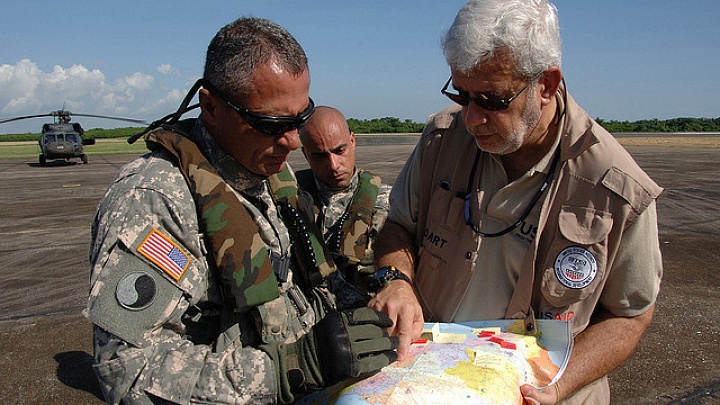
The humanitarian world often has a healthy suspicion of the military. This is understandable. It can be very dangerous for humanitarian organizations and USAID personnel to be conflated with the military, which skeptical locals sometimes consider the same thing as the CIA overseas. However, as a former member of the military I have seen military Civil Affairs units doing good, genuine humanitarian work in dangerous areas . . . winning the hearts and minds. And I have been out in Iraq interacting daily with the local Iraqis, as have many of my fellow soldiers.
The military and humanitarian organizations both deploy to dangerous areas that have severe needs. But they rarely, with notable exceptions, ever share information, leading to an expensive duplication of effort by the military and aid organizations. In 2007, Ellen B. Laipson hypothesized in an excellent pieceon relations between NGOs and the intelligence and defense communities that information sharing was improving, but that “effective communication [still faced] many hurdles.” Nowhere was this more evident than during the recent Ebola crisis.
One of the clearest examples of the flexibility of mission the military can have during a humanitarian disaster came at the height of the Ebola crisis. As many aid organizations were either pulling their staff from infected areas or struggling to bring enough new people in, the military deployed personnel to these same locations. Whether that was an effective use of the military is open to debate. Yet overall, the military and humanitarian groups had the same mission: To stop the spread of the disease. What resulted from this cooperation was an unprecedented move by the National Geospatial-Intelligence Agency to share their open source data on a public website. Lee Schwartz, the geographer of the United States, at the State Department oversaw this move. There has been a continuous dialogue between these two particular agencies.
Nonsensical Stove-piping
At this time I knew a defense contracting company which was running an Ebola project. On their behalf I contacted some of my associates at an NGO as well as at USAID and asked whether they would be willing to share their on-the-ground gathered location information regarding checkpoints and clinics for a project. Both groups responded with a resounding no because it might be utilized by the U.S. military-the same military that was rushing into Liberia to help. So, instead the government had to pay for countless man-hours for this same information to be duplicated, not by conducting covert operations, but by scouring open source information. The end result was that the government acquired, for the most part, the same information the aid groups on the ground were privy to and were going to utilize for their mission. Further, it is more than likely these groups on the ground still had better, more credible information.
The defense and intelligence communities have expertise and budgets that allow them to do incredible analytical work. NGOs and USAID often have the benefit of boots on the ground and better cultural understanding. It is necessary for both sides to recognize how they can provide benefit to one another without harming each others mission.
The above example is something I have experienced time and time again while compiling information in the defense arena. Often the intelligence and defense communities are willing to share their unclassified analytical research with other government agencies such as State and USAID, but rarely does defense or the intelligence community get anything in return, even from government counterparts.
Overall, it is necessary for both sides to recognize how they can provide benefit to one another without releasing classified information that might endanger lives on the ground. The defense and intelligence communities have large budgets that allow them to do incredibly detailed analytical work. NGOs and USAID often have the benefit of boots on the ground, which allows for greater understanding of cultural factors and timely data, but lack the desire and budget to do structured analytical work for more strategic purposes. When it comes to peacebuilding operations all sides likely will see benefits to cooperation and information-sharing. Most intelligence and defense agency offices already have liaisons with one another and with the State Department in an effort to share information, but this is generally limited to one person representing the entirety of an agency.
I propose that a fusion center be created for information sharing on peacebuilding initiatives. A fusion center can provide a dependable repository of information where liaisons from State, USAID, Defense, Intelligence, and NGOs that want to participate can work together to address crisis situations in a timely manner. For the government elements it would be a cost-effective pooling of resources to avoid duplication. For NGOs it would provide more robust products that larger government resources can provide.
When a crisis such as an Ebola outbreak strikes, it is a waste of time, money and human resources to duplicate each other’s data. Bureaucratic distrust should not get in the way of timely delivery of humanitarian services.
[Photo: Flickr CC: The U.S. Army]


This proposal is well-meaning, but misguided. We don’t need yet another new agency, facility, or organization. What the author describes as a problem is a problem in information management and dissemination. Improve the process, don’t go creating new organizations requiring staffing and funding that don’t exist,
The big stumbling block here is that many NGOs absolutely cannot share information back to the US military and still have access to the areas they have to operate in. They are already seen as spies by a large number of governments and groups around the world, and this would just validate these accusations in the eyes of the accusers. Don’t get me wrong, I love the amount of information that is available to these organizations, but they are not intelligence collectors, and any sharing system must not interfere with their primary focus.
Great idea, but the Open Source Center already exists – https://www.opensource.gov. How open source data is collected and shared effectively across different agencies (and potentially NGOs) represents a challenge and opportunity on many levels.
Sharing Open Source intelligence means simply sharing information that is publicly available through open, public sources when one of the groups has already done the work rather than having 2 or more of these groups do the same work over again. It prevents duplication of effort and saves time and money. Perhaps if we did the same thing and simply left out the world ‘intelligence’ your concerns would be addressed. The problem is simply one of vocabulary, public relations, and perception. In reality, its not a problem at all.
I used to be an advocate of OSINT in the military where I worked for 45 years – 20 active duty, 25 defense employee. There are thousands of data bases, journals, magazines, etc., that are unclassified but not free. In fact some costs hundreds of dollars a month to subscribe to, while many cost hundreds of dollars a year. Examples are Reuters, Lloyds of London, Interpol, and other international agencies that cover international commercial, criminal and governmental activities. As a young analyst, I had to convince my leadership that I could track oil movements from producer to consumer by tracking insurance paid by shipping companies. It worked but it was not free.
We already have one, it’s called the Academic Community and the Commercial sector…….you know the place where 90% of the open source material originates from in the first place….
As others have already noted there is a reason the DoD/IC needs to stay clear of sharing anything with NGOs, particularly those not based in the United States